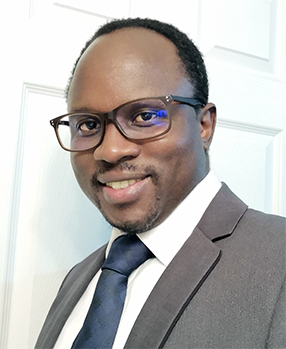FIMS News
Contact Information
FIMS Communications
Becky Blue
Email
519-661-2111x88493
FIMS & Nursing Building
Rm 2060C
David Walugembe: Gaining knowledge and improving health policy to save lives back home

By Elizabeth Lam
David's hometown: Kiswera- Masaka, Uganda
David Walugembe--Doctoral Health Information Science candidate of today, healthcare policy influencer of tomorrow.
---
David Walugembe travelled across the Atlantic Ocean to complete his PhD so he could gain expertise in knowledge translation and the implementation of health policy aimed at improving maternal, newborn and child health outcomes in his home country of Uganda, in Africa.
In 2014, while completing a fellowship program at Makerere University of Public Health in Kampala, Uganda, David and his mentor identified the use of evidence informed interventions to reduce the high maternal and perinatal mortality rates in Uganda as an area that needed further study. The Centers for Disease Control and Prevention Fellowship Program at Makerere University provided a first opportunity for Walugembe to ask an important question.
“Why is it that some health facilities within the same health system and context manage to successfully implement policy interventions while others struggle? Why should 16 mothers continue to die everyday in Uganda, while evidence-informed interventions to reduce maternal and perinatal mortality exist and are available? Why should the experience of giving birth to a new life turn out to be sad and associated with death?” asked David. “I needed to find a solution. That’s how I ended up trying to tie my expertise and my passion for knowledge translation toward this problem. I thought if I contributed, it would make a difference.”
In order to make an impact in the Ugandan healthcare system, David knew he needed to leave home to access the education and resources available in Canada. Jointly offered through the Faculty of Information & Media Studies and the Faculty of Health Sciences, the Health Information Science program perfectly blends his previous undergraduate degree in Library and Information Science and his Master of Public Health degree. The most crucial factors that helped David choose Western was his ability to obtain a four-year scholarship and the availability of a willing supervisor. This made it possible for him to pursue a high-quality education that otherwise wouldn’t have been as accessible for him. “There are not many universities in the world that are offering this kind program, so it had to be Western.”
Fun Fact
"While growing up, I had many passions and aspirations. One of them was to be an invisible entertainer-radio presenter working as a host of a late-night radio show and playing lots of soothing and calm music that would serenade my audience to sleep. The whole idea of being an invisible entertainer sounds funny, but kind of resonates with my preference for being a behind-the-scenes person." -- David Walugembe
Now, in his fifth year, his favourite aspect of the Health Information Science program is applying the different theories underpinning his research and data and knowing that they will help to answer his questions about the variations in the implementation of health policy interventions that he has observed.
“One of the things I’m so fond about in my PhD program is the whole bit around using theory to navigate the implementation of health policy interventions. It is something that I had never had as an undergraduate or master’s student,” said David. “So, that’s unique and I feel like it adds a lot of value because when I use a theory, some other person can also use my approach and see why implementation succeeds or fails, or someone can apply another theory to acquire more knowledge, and then design and improve implementation processes.”
To break from his studying, researching and data analysis, David enjoys simple things to ease his mind. He indulges in reading self-improvement books—"human development” books as he likes to call them—and writes newspaper articles for the Daily Monitor in Uganda. In his writing, he infuses ideas and knowledge acquired from his studies to address topical issues in his home country.
During the summer months, David gathers with his friends to play soccer, which reminds him a little bit of home. “When the sun is shining bright, and it’s warm in this part of the world, soccer is one of my pastimes. I do play soccer with a group of colleagues from mostly West African countries, like Ghana and Nigeria.”
Profiles in the Meet Our Students section are written by students in the Master of Media in Journalism & Communication program, who are enrolled in MMJC 9604 - Professional Writing.


